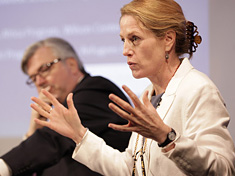-
Alice Thomas: Climate Change Effects and Responses Profoundly Undermine Human Rights
June 12, 2015 By Linnea Bennett
After Typhoon Haiyan ripped across the Philippines in 2014 leveling nearly every building in sight, 4 million people – mostly poor and from coastal regions – were displaced. In response, the government set up “no build” zones in vulnerable areas and worked to move people to new land. But many of the newly relocated people discovered this land came with no access to water, electricity, or other services.
After Typhoon Haiyan ripped across the Philippines in 2014 leveling nearly every building in sight, 4 million people – mostly poor and from coastal regions – were displaced. In response, the government set up “no build” zones in vulnerable areas and worked to move people to new land. But many of the newly relocated people discovered this land came with no access to water, electricity, or other services.“There’s a hasty effort to get people out of tents and move them somewhere else, but it’s done in a way that creates more vulnerabilities and undermines human rights,” says Alice Thomas, manager of the Climate Displacement Program at Refugees International, in this week’s podcast. “It’s probably one of the most profound human right impacts of climate change, and one for which there is currently no solution.”
Loss of Identity
“It’s been widely recognized by the Human Rights Council, by governments, by human rights experts, that climate change will directly and indirectly undermine the realization and enjoyment of a wide range of human rights,” says Thomas.
“There was no one to help these people when they needed water and food”Flooding, for example, can impact disease rates, while drought can affect food security, and major storms threaten housing and infrastructure. Meanwhile, warming temperatures are melting glaciers and decreasing snow pack, upon which one sixth of the world’s population relies on for fresh water.
Climate change also threatens people’s right to self-determination, says Thomas. This is particularly relevant to low-lying islands, some of which are facing the prospect of complete inundation. Much of the international community has moved away from discussions about helping communities adapt and is instead focusing on relocation efforts. But Thomas argues that relocation deprives islanders of their right to self-determination as they are stripped of their homes and, subsequently, their identity.
A Different Model?
To understand how climate change affects marginalized and already vulnerable groups more intensely, consider fragile and conflict-affected states, says Thomas. Somalia experienced an intense drought in 2011, causing a famine that killed a quarter of a million people and displaced another million, many of which fled to other countries. When refugees tried to return afterwards, they found the country’s other vulnerabilities, such as poor governance and decades of civil conflict, had been exacerbated, making it dangerous or impossible to come home. “The lack of a functioning government meant that, unlike California, there was no one to help these people when they needed water and food,” says Thomas.
Because climate change is experienced in conjunction with other challenges, like poor governance, poverty, and insecurity, it can’t be addressed in isolation. Thomas says breaking down silos in the funding community could be a more effective approach. By pooling resources for disaster risk reduction, humanitarian relief, and development, governments and relief organizations could help people prepare and adapt to climate change while respecting their rights.
But barriers persist. Only one percent of overseas development aid is dedicated to disaster risk management, Thomas says. The third international Financing for Development conference in July represents an opportunity for governments and donors to change this. “I urge development and humanitarian and [disaster risk reduction] funders to look for opportunities to channel this funding in a way that promotes rights,” she says.
Alice Thomas spoke at the Wilson Center on June 4. Download her slides for more.
Friday Podcasts are also available for download on iTunes.
Sources: Global Humanitarian Assistance, UN Intergovernmental Panel on Climate Change.
Topics: adaptation, Africa, Arctic, climate change, conflict, development, disaster relief, economics, environment, environmental security, flooding, food security, Friday Podcasts, funding, gender, global health, humanitarian, migration, natural resources, Philippines, podcast, population, poverty, risk and resilience, security, Somalia
 A Publication of the Stimson Center.
A Publication of the Stimson Center.




